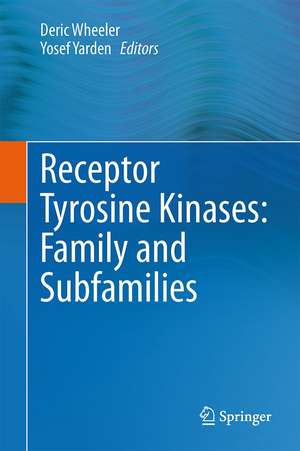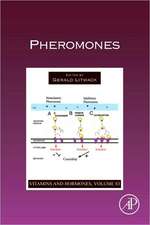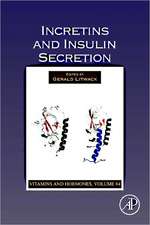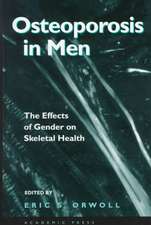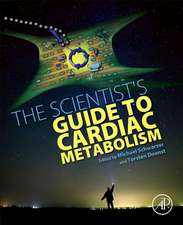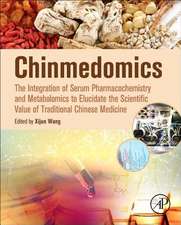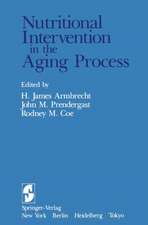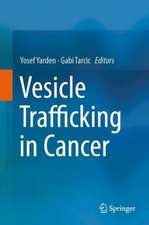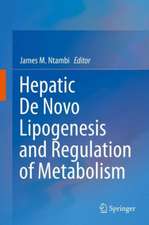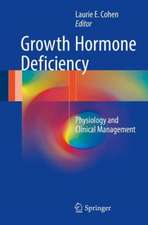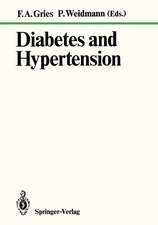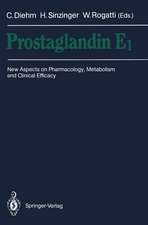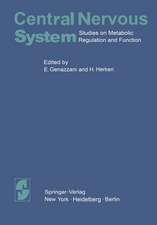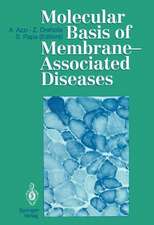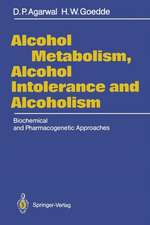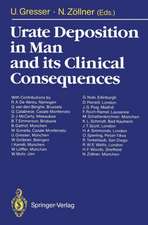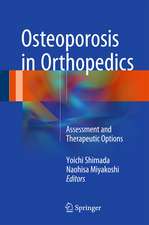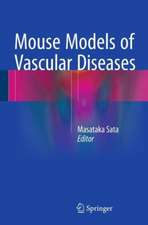Receptor Tyrosine Kinases: Family and Subfamilies
Editat de Deric L. Wheeler, Yosef Yardenen Limba Engleză Hardback – 12 aug 2015
| Toate formatele și edițiile | Preț | Express |
|---|---|---|
| Paperback (2) | 796.43 lei 38-44 zile | |
| Springer – 9 sep 2016 | 796.43 lei 38-44 zile | |
| Springer International Publishing – 21 oct 2016 | 1083.73 lei 38-44 zile | |
| Hardback (2) | 958.38 lei 6-8 săpt. | |
| Springer – 26 noi 2014 | 958.38 lei 6-8 săpt. | |
| Springer International Publishing – 12 aug 2015 | 1120.49 lei 38-44 zile |
Preț: 1120.49 lei
Preț vechi: 1474.33 lei
-24% Nou
Puncte Express: 1681
Preț estimativ în valută:
214.40€ • 224.46$ • 177.41£
214.40€ • 224.46$ • 177.41£
Carte tipărită la comandă
Livrare economică 03-09 aprilie
Preluare comenzi: 021 569.72.76
Specificații
ISBN-13: 9783319118871
ISBN-10: 3319118870
Pagini: 686
Ilustrații: XVII, 878 p. 100 illus., 79 illus. in color.
Dimensiuni: 155 x 235 x 45 mm
Greutate: 1.84 kg
Ediția:1st ed. 2015
Editura: Springer International Publishing
Colecția Springer
Locul publicării:Cham, Switzerland
ISBN-10: 3319118870
Pagini: 686
Ilustrații: XVII, 878 p. 100 illus., 79 illus. in color.
Dimensiuni: 155 x 235 x 45 mm
Greutate: 1.84 kg
Ediția:1st ed. 2015
Editura: Springer International Publishing
Colecția Springer
Locul publicării:Cham, Switzerland
Public țintă
ResearchCuprins
Anaplastic Lymphoma Kinase (ALK) Receptor Tyrosine Kinase (RTK) Family.- The TAM Receptor Family.- DDR Receptor Tyrosine Kinase Family.- EGFR/ERBB Receptor Tyrosine Kinase Family.- Eph Receptor Tyrosine Kinase Family.- Receptor Tyrosine Kinase textbook – Fibroblast Growth Factor Receptor (FGFR).- Insulin/IGF1 Receptors (INSR/IGF1R) Family.- MET Receptor Tyrosine Kinase Family.- MuSK Receptor Family.- The PDGFR Receptor Family.- PTK7 Receptor Tyrosine Kinase Family.- RET Receptor Tyrosine Kinase.- ROR Receptor Tyrosine Kinase Family.- ROS1 Receptor Tyrosine Kinase.- The RYK Receptor Tyrosine Kinase Subfamily.- TIE Receptor Tyrosine Kinase Family.- TRK Receptor Family.- The VEGF Family of Ligands and Receptors.- NOK Receptor Tyrosine Kinase Family.
Recenzii
“An in depth study of the RTK families in 19 chapters. … Clearly written and with extensive references after each chapter. For endocrinologists, molecular biologists and oncologists.” (Pediatric Endocrinology Reviews (PER), Vol. 13 (3), March, 2016)
Notă biografică
Dr. Deric Wheeler received an M.S. in pathology from the University of Iowa and a Ph.D. in Cancer Biology from the University of Wisconsin. He conducted his postdoctoral training at the Fred Hutchinson Cancer Research Center in Seattle, WA, and at the University of Wisconsin School of Medicine and Public Health in Madison, where he eventually transitioned to faculty as an assistant professor in the department of human oncology. Dr. Wheeler’s lab research centers on resistance to molecular targeting agents and the role of subcellular localization of receptor tyrosine kinases and their roles in oncogenesis.
Dr. Yosef Yarden received a Ph.D. in Molecular Biology from the Weizmann Institute of Science in Rehovot, Israel. He completed postdoctoral training at Genentech, Inc. in San Francisco and at the Massachusetts Institute of Technology in Cambridge. He returned to the Weizmann Institute of Science first as an assistant professor and then later as a full professor. His past administrative responsibilities at the Weizmann Institute include Dean of the Faculty of Biology, Vice-President for Academic Affairs, Director of the M.D. Moross Institute for Cancer Research, and Dean of the Feinberg Graduate School. Dr. Yarden’s lab research centers on the roles played by growth factors and receptor tyrosine kinases in tumor progression.
Dr. Yosef Yarden received a Ph.D. in Molecular Biology from the Weizmann Institute of Science in Rehovot, Israel. He completed postdoctoral training at Genentech, Inc. in San Francisco and at the Massachusetts Institute of Technology in Cambridge. He returned to the Weizmann Institute of Science first as an assistant professor and then later as a full professor. His past administrative responsibilities at the Weizmann Institute include Dean of the Faculty of Biology, Vice-President for Academic Affairs, Director of the M.D. Moross Institute for Cancer Research, and Dean of the Feinberg Graduate School. Dr. Yarden’s lab research centers on the roles played by growth factors and receptor tyrosine kinases in tumor progression.
Textul de pe ultima copertă
Receptor tyrosine kinases (RTKs) play critical roles in embryogenesis, normal physiology and several diseases, and over the last decade have become the number one targets of cancer drugs. Receptor Tyrosine Kinase: Family and Subfamilies systematically covers, for the first time, the shared structural and functional features of the RTK family. Understanding the evolutionary origin of the fifty-eight RTKs, their roles in invertebrates and in humans, as well as downstream signaling pathways, is essential for fundamental research and for attempts to develop pharmacological agents able to enhance or intercept their actions. The assembly of chapters written by experts underscores commonalities and is an ideal companion volume to Receptor Tyrosine Kinases: Structure, Functions and Role in Human Disease, which refers to specific subfamilies of RTKs, along with their unique landmarks.
Caracteristici
Highlights each RTK family and the multiple receptors within each family
Discusses each receptor’s family in development and human disease
Analyses each family’s receptors, receptor processing and signal attenuation
Discusses each receptor’s family in development and human disease
Analyses each family’s receptors, receptor processing and signal attenuation
Descriere
Descriere de la o altă ediție sau format:
Receptor tyrosine kinases (RTKs) play critical roles in embryogenesis, normal physiology and several diseases, and over the last decade they became the Number 1 targets of cancer drugs. Receptor Tyrosine Kinase: Structure, Functions and Role in Human Disease systematically covers, for the first time, the shared structural and functional features of the RTK family. Understanding the evolutionary origin of the 58 RTKs, their roles in invertebrates and in human, as well as downstream signaling pathways, is essential for fundamental research and for attempts to develop pharmacological agents able to enhance or intercept their actions. The assembly of chapters written by experts underscores commonalities and is an ideal companion volume to The Receptor Tyrosine Kinase Family, which refers to specific subfamilies of RTKs, along with their unique landmarks.
Receptor tyrosine kinases (RTKs) play critical roles in embryogenesis, normal physiology and several diseases, and over the last decade they became the Number 1 targets of cancer drugs. Receptor Tyrosine Kinase: Structure, Functions and Role in Human Disease systematically covers, for the first time, the shared structural and functional features of the RTK family. Understanding the evolutionary origin of the 58 RTKs, their roles in invertebrates and in human, as well as downstream signaling pathways, is essential for fundamental research and for attempts to develop pharmacological agents able to enhance or intercept their actions. The assembly of chapters written by experts underscores commonalities and is an ideal companion volume to The Receptor Tyrosine Kinase Family, which refers to specific subfamilies of RTKs, along with their unique landmarks.
